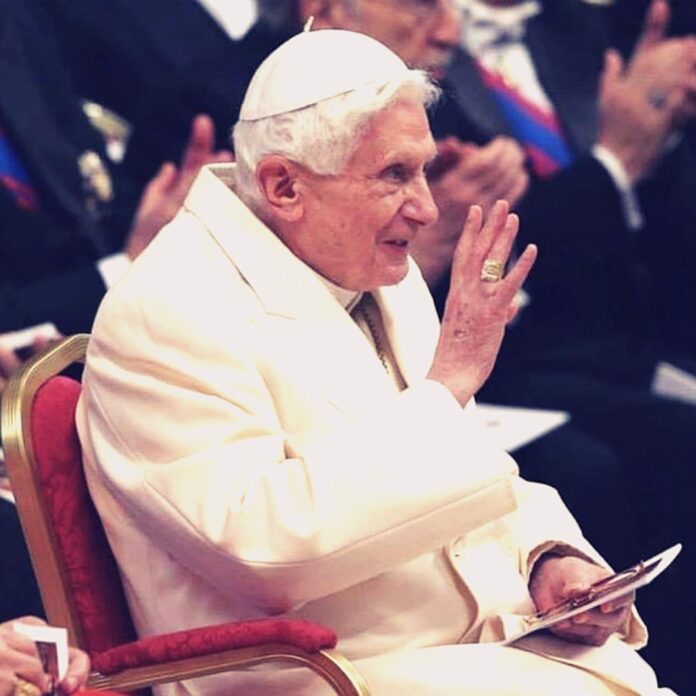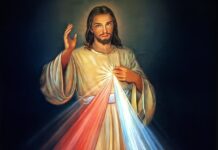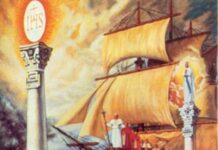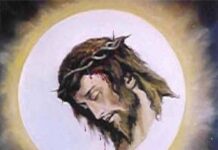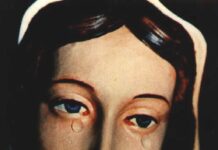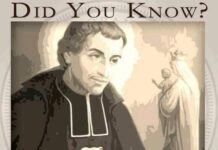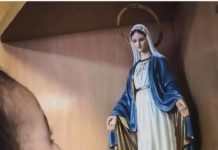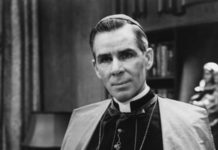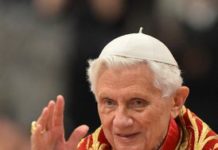RECENT POPES WARN OF THE SIGNS OF THE TIMES
Recent Popes have spoken of the times at hand and have seen what was already beginning to occur in their lifetimes. Here are a few excerpts from them.
Pope Leo XIII
When will all these things happen? Recent prophecies have indicated that we are now in the times of the rise of evil and the earthly reign of the antichrist. Reportedly, on October 13, 1884, and on what would thirtythree years later be the date of the Miracle of Fatima, Pope Leo XIII had just completed a celebration of Mass in one of the Vatican’s private chapels. Standing at the foot of the altar, he suddenly turned pale and collapsed to the floor, apparently the victim of a stroke or heart attack. However, neither malady was the cause of his collapse. Instead, he had just received a vision of the future of the Church. After a few minutes spent in what seemed like a coma, he revived and remarked to those around him, “Oh, what a horrible picture I was permitted to see!” During Pope Leo’s ecstasy, he heard two voices, one deep and coarse, which he understood to be Satan challenging the other voice, Jesus. The conversation reportedly went like this:
Satan: “Given enough time and enough power, I can destroy your Church.” Jesus: “How much time and how much power?” Satan: “100 years and a greater power over those who will give themselves to my service.” Jesus: “You have the time and you will have the power. Do with them what you will.”
What Leo XIII saw, as described later by those who talked to him at the time of his vision, was a period of about one hundred years when the power of Satan would reach its zenith. That period has become known as The Hundred Years’ Reign of Satan. Leo XIII was so shaken by the vision of the depravity of moral and spiritual values both inside and outside the Church that he immediately composed a prayer that he then had said at the end of each Mass celebrated in the Catholic Church. The Prayer of St. Michael the Archangel was hence said continuously, until the Mass was revised in the Second Vatican Council. It is still an important part of the Rosary prayer today. We must remember that while the devil has real power granted him by God, though it is not limitless, the Lord is all-powerful and His mercy and compassion are infinite. St. John Paul II spoke of the continued importance of this prayer in our times, saying:
The Book of Revelation refers to [the] battle, recalling before our eyes the image of St. Michael the Archangel (Revelation 12:7). Pope Leo XIII certainly had a very vivid recollection of this scene when, at the end of the (nineteenth century, he introduced a special prayer to St. Michael throughout the Church. Although this prayer is no longer recited at the end of Mass, I ask everyone not to forget (the St. Michael Prayer] and to recite it to obtain help in the battle against forces of darkness and against the spirit of this world.
The St. Michael Prayer
Saint Michael the Archangel, defend us in battle; be our protection against the wickedness and snares of the devil. May God rebuke him, we humbly pray; and do thou, O Prince of the heavenly host, by the power of God, cast into hell Satan and all the evil spirits who prowl about the world seeking the ruin of souls. Amen.
Ven. Pius XII
Pius XII saw the coming times. After an apparition of Jesus and Mary, he reportedly told one of his assistants:
Mankind must prepare itself for sufferings such as it has never before experienced…the darkest since the deluge…The hour has struck, the battle, the most widespread, bitter and ferocious the world has ever known, has been joined. It must be fought to the finish… Suppose, dear friend, that Communism was only the most visible of the instruments of subversion to be used against the Church and the traditions of Divine Revelation … I am worried by the Blessed Virgin’s messages to Lucy of Fatima. This persistence of Mary about the dangers which menace the Church is a divine warning against the suicide of altering the Faith, in Her liturgy … A day will come when the civilized world will deny its God, when the Church will doubt as Peter doubted. She will be tempted to believe that man has become God … In our churches, Christians will search in vain for the red lamp where God awaits them, like Mary Magdalene weeping before the empty tomb, they will ask, ‘Where have they taken Him?’…I hear all around me innovators who wish to dismantle the Sacred Chapel, destroy the universal flame of the Church, reject Her ornaments and make Her feel remorse for Her historical past…
Pope Paul VI
On October 13, 1977, the anniversary of Fatima, Paul VI stated:
We believed that after the Council (i.e. Vatican II) would come a day of sunshine in the history of the Church. But instead there has come a day of clouds and storms, and of darkness of searching and uncertainties… And how did this come about?… There has been a power, an adversary power. Let us call him by his name: the devil. It is as if from some mysterious crack, no, it is not mysterious, from some crack the smoke of Satan has entered the temple of God. (1972) The tail of the devil is functioning in the disintegration of the Catholic World. The darkness of Satan has entered and spread throughout the Catholic Church even to its summit. Apostasy, the loss of the faith, is spreading throughout the world and into the highest levels within the Church.
St. John Paul II
Pope John Paul II, as Karol Cardinal Wojtyla, spoke these words during a visit to the United States in 1976:
We are now standing in the face of the greatest historical confrontation humanity has gone through. I do not think that wide circles of the American society or wide circles of the Christian community realize this fully. We are now facing the final confrontation between the Church and the anti-Church, of the Gospel versus the anti-Gospel. This confrontation lies within the plans of Divine Providence… It is a test of 2,000 years of culture and Christian civilization with all of its consequences for human dignity, individual rights,
human rights and the rights of nations. By this statement, he makes it clear he had a sense of the times and wanted to warn us about them.
Pope Benedict XVI
In 2008, Pope Benedict spoke of the end times, saying:
Before the Lord’s arrival, there will be apostasy, and one well described as the ‘man of lawlessness’, ‘the son of perdition must be revealed, who tradition would come to call the Antichrist. As Cardinal Joseph Ratzinger (Pope Benedict XVI), he wrote an article, “The Church Will Become Small”, saying:
The Church will become small and will have to start afresh more or less from the beginning… And so it seems certain to me that the Church is facing very hard times. The real crisis has scarcely begun. We will have to count on terrific upheavals. But I am equally certain about what will remain at the end: not the Church of the political cult, which is dead already, but the Church of faith. She may well no longer be the dominant social power to the extent that she was until recently; but she will enjoy a fresh blossoming and be seen as man’s home, where he will find life and hope beyond death.
Benedict XVI has also related our times to the Book of Revelation, saying:
The threat of judgment also concerns us, the Church in Europe, Europe and the West in general… the Lord is also crying out to our ears the words that in the Book of Revelation he addresses to the Church of Ephesus: ‘If you do not repent I will come to you and remove your lampstand from its place’… let this warning ring out with its full seriousness in our hearts, while crying to the Lord: ‘Help us to repent! Give all of us the grace of true renewall Do not allow your light in our midst to blow out! Strengthen our faith, our hope and our love, so that we can bear good fruit. We see of course that today too the dragon wants to devour God who made himself a Child. Do not fear for this seemingly frail God; the fight has already been won… We see this power, the force of the red dragon… in new and different ways. It exists in the form of materialistic ideologies that tell us it is absurd to think of God; it is absurd to observe God’s commandments: they are a leftover from a time past. Life is only worth living for its own sake. Take everything we can get in this brief moment of life. Consumerism, selfishness, and entertainment alone are worthwhile.
Pope Benedict warned about this erosion of truth, when just before being elected Pope, he discussed the perils of our times that of the prevailing culture today which has but one message of promoting relativism, whereby each person today is directed to be “tossed here and there, carried about by every wind of doctrine”. In trepidation, he declared: “We are building a dictatorship of relativism that does not recognize anything as definitive and whose ultimate goal consists solely of one’s own ego and desires.” And consequences will be dire.
In late 2010, Benedict went on to prophetically draw a link between the fall of the Roman Empire and our own times. First, describing the decline of the Roman Empire he said, “The disintegration of the key principles of law and of the fundamental moral attitudes underpinning them burst open the dams which until that time had protected peaceful coexistence among peoples… There was no power in sight that could put a stop to this decline.” Then, comparing those times to our own, he added: “For all its new hopes and possibilities, our world is at the same time troubled by the sense that moral consensus is collapsing, consensus without which juridical and political structures cannot function. Consequently the forces mobilized for the defense of such structures seem doomed to failure.” Referring to these recent “great tribulations to which we have been exposed”, he concluded: “The very future of the world is at stake.”
During his pontificate, Benedict hinted about his own retirement (and possible future fate). On April 29, 2009, he visited the tomb of an obscure medieval Pope named St. Celestine V. After a brief prayer, Benedict left his pallium, the symbol of his office as Bishop of Rome and Pope, on Celestine’s tomb. Later, on July 4, 2010, Pope Benedict again went to visit St. Celestine, this time at the cathedral where his relics are entombed. Few people noticed his actions at the time. But, as he himself retired in 2013, his gestures took on a significant and personal meaning. And it relates to St. Celestine, who had been elevated to the papacy, somewhat against his will, shortly before his 80th birthday (Ratzinger was 78 when he was elected Pope in 2005). Just five months later, after issuing a formal decree allowing popes to resign, Pope Celestine V abruptly resigned from the papacy.
And now Pope Benedict XVI has chosen to follow in the footsteps of this venerable model. It might be interesting to note that after retiring, Pope Celestine’s successor, Pope Boniface VIII had him imprisoned in a suffocating cell, where he died 10 months later. Some have even considered that he may have been directly murdered, as a hole was later found in his skull (but this theory has been somewhat dispelled).
We may wonder what the fate will be for Benedict, who is now Pope Emeritus. There is an interesting prophecy of St. Pius X, who early in the twentieth century revealed some detail about a future retired pope, saying:
I saw one of my successors taking to flight over the bodies of his brethren. He will take refuge in disguise somewhere; and after a short retirement he will die a
cruel death. Time will tell. We must pray for our Church and Pope(s) in these times. What great insights and words of caution these recent Popes give us for our times!


